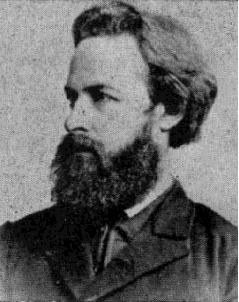
The Anarchist Encyclopedia: |

The Anarchist Encyclopedia: |

RECLUS, JEAN JACQUES ELISEE (1830—1905)French geographer, was born at Sainte-Foy la Grande (Gironde), on the 15th of March 1830. He was the second son of a Protestant pastor, who had a family of twelve children, several of whom acquired some celebrity either as men of letters, politicians or members of the learned professions.
His education, begun in Rhenish Prussia, was continued in the Protestant college of Montauhan, and completed at the university of Berlin, where he followed a long course of geography under Karl Ritter.
Withdrawing from France in consequence of the events of December 1851, he spent the next six years (1852—57) visiting the British Isles, the United States, Central America, and Colombia. On his return to Paris he contributed to the Revue des deux mondes, the Tour du monde and other periodicals a large number of articles embodying the results of his geographical work. Among other works at this period was an excellent short book, Histoire d’un ruisseau, in which he traces the development of a great river from source to mouth. In 1867—68 he published La Terre; description des phénomènes de la vie du globe, in two volumes.
During the siege of Paris, Reclus shared in the aerostatic operations conducted by M. Nadar, and also served in the National Guard, while as a member of the Association Nationale des Travailleurs he published in the Cri du Peuple a hostile manifesto against the government of Versailles in connexion with the Communist rising of the 18th of March 1871.
Continuing to serve in the National Guard, now in open revolt, he was taken prisoner on the 5th of April, and on the 16th of November sentenced to transportation for life; but, largely at the instance of influential deputations from England, the sentence was commuted in January 1872 to perpetual banishment.
Thereupon, after a short visit to Italy, he settled at Clarens, in Switzerland, where he resumed his literary labours, and, after producing the Histoire d’une montagne (a companion to Histoire d’un ruisseau), wrote nearly the whole of his great work, La Nouvelle Géographic universelle, la terre et les hoinmes, 19 vols. (1875—94). This is a stupendous compilation, profusely illustrated with maps, plans, and engravings, and was crowned with the gold medal of the Paris Geographical Society in 1892. An English edition appeared simultaneously, also in 19 vols., the first four by E. G. Ravenstein, the rest by A. H. Keane.
Extreme accuracy and brilliant exposition form the leading characteristics of all Reclus’s writings, which thus possess permanent literary and scientific value.
In 1882 Reclus initiated the "Anti-Marriage Movement," in accordance with which he allowed his two daughters to marry without any civil or religious sanction whatever. This step caused no little embarrassment to many of his well-wishers, and was followed by government prosecutions, instituted in the High Court of Lyons, against the anarchists, members of the International Association, of which Reclus and Prince Kropotkin were designated as the two chief organizers. The prince was arrested and condemned to five years’ imprisonment, but Reclus, being resident in Switzerland, escaped.
After 1892 he filled the chair of comparative geography in the university of Brussels, and contributed several important memoirs to French, German and English scientific journals. Among these may be mentioned "The Progress of Mankind" (Contemp. Rev. , 1896); "Attila de Gerando" (Rev. Géograph. , 1898); "A great Globe" (Geograph. Journ. , 1898); "L’Extrême-Orient" (Bul. Antwerp Geo. Soc. , 1898), a thoughtful study of the political geography of the Far East and its possible changes; "La Perse" (Bul. Soc. Neuchateloise, 1899); "La Phénice et les Phéniciens" (ibid., 1900); La Chine et al diplomatie européenne ("L'Humanité nouvelle" series, 1900); L'Enseignement de la géographie (Instit. Geograph. de Bruxelles, No. 5, 1901). Shortly before his death Reclus had completed L'Homme et la terre, in which he set the crown on his previous greater works by considering man in his development relative to geographical environment.
Reclus died at Thourout, near Bruges, on the 4th of July 1905.
— From the 1911 edition of the Encyclopedia Britannica, pages 957-58
See also collected material at the Anarchy Archives,
http://dwardmac.pitzer.edu/Anarchist_Archives/bright/reclus/reclus.htmlResearch on Anarchism Page,
raforum.info/reclus/?lang=enInternational Institute of Social History,
http://www.iisg.nl/archives/en/files/r/10767478.phpMiscellaneous articles & graphics from the Internet have been archived & are accessible at
http://recollectionbooks.com/bleed/Encyclopedia/ReclusElisee/In-depth biography, graphics, chronology & more at:
http://lycee.reclus.free.fr/index1.htm
Possibly the only anarchist geographer with a wine dedicated in his honor...the 1991 vintage is no longer available, but the 1999 vintage is said to be as good...
Cuvee Elisee
// --
Celebrities in Switzerland: Elisee Reclus
Reclus, Elisee (1830 - 1907) anarchist / Scientist /
Geographer Elisée Reclus lived over over 22 years in Switzerland on the shores of Lake Geneva. Born in 1830, he initially went to the Protestant College in Montauban before studying geography under Carl Ritter in Berlin. He identified with with the Republicans during the Revolution of 1848. Forced to leave France due to his opposition to the coup d'Etat of December 2, 1851, he would not return for another six years. Won over by the anarchist theses put forth by Bakunin whom he met in 1865, he became a theorist of anarchism.
Elisée Reclus was once again banished due to his participation in the 1870 Siege and Commune of Paris and he exiled in Switzerland. He wrote for the journal Le Révolté, published by Russian anarchist Kropotkin, and ran the newspaper L'Etendard révolutionnaire. Elisée Reclus was not blind to the beauty of Lake Geneva: The splendor of the lake and the circle of mountains reflected in it, (...) a climate milder than in neighboring countries, have made this sheltered corner of Switzerland a traveler's favorite. (...) With their cosmopolitan population, Montreux and Vevey belong to the entire human race.
As a consequence, he had a villa built in Clarens, which he called Le Rivage. He lived in this house on the shores of Lake Geneva from 1879 to 1892. There he worked on his Nouvelle géographie universelle, which would crown him the father of modern geography. His home was warm and inviting and he often hosted his anarchist friends. In 1892, the geographer and anarchist left Clarens for Brussels, where he taught at the university.
Page updated March 2005; March 2006; July 2009
Use your back button to return to your previous page,
Or visitThe Anarchist Encyclopedia | Daily Bleed Calendar | The Stan Iverson Archives | The Anarchist Timeline
anti-CopyRite 1997-3000, more or less
Questions, suggestions, additions, corrections to David Brown at dailybleed @ gmail.com
The Anarchist Encyclopedia is freely sponsored & produced by Recollection Used Books